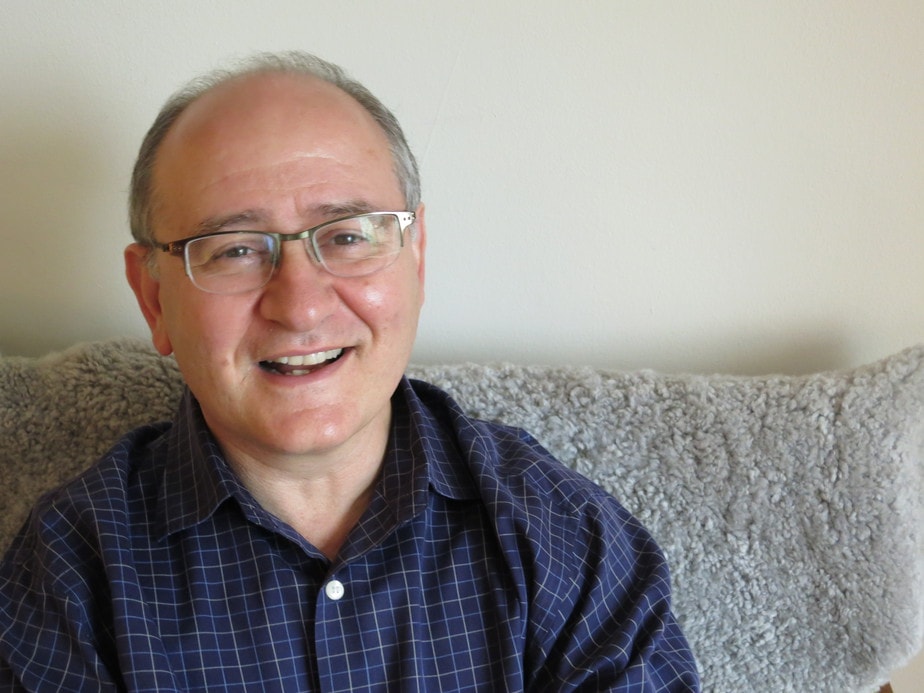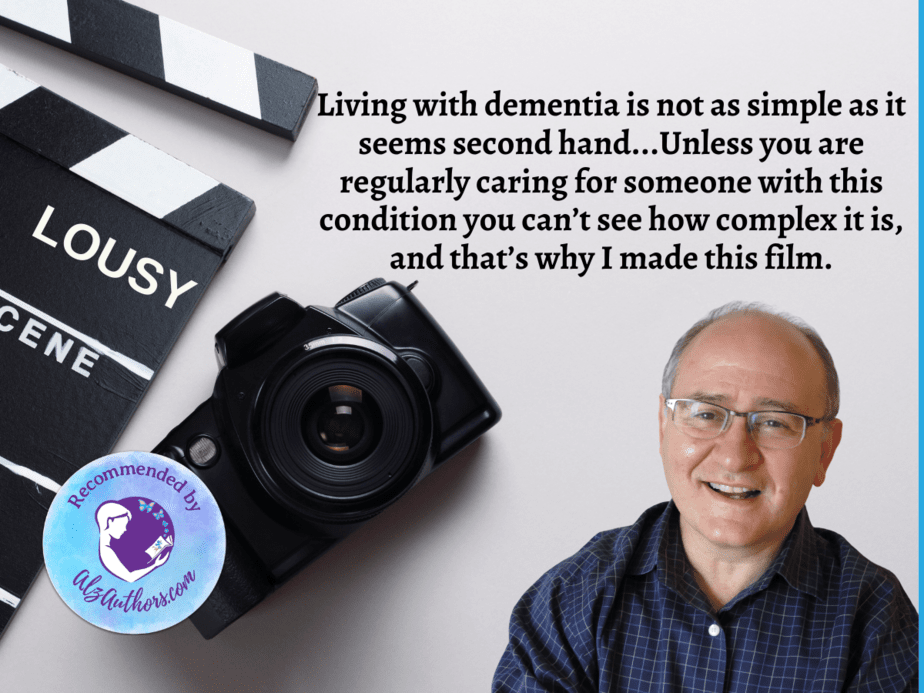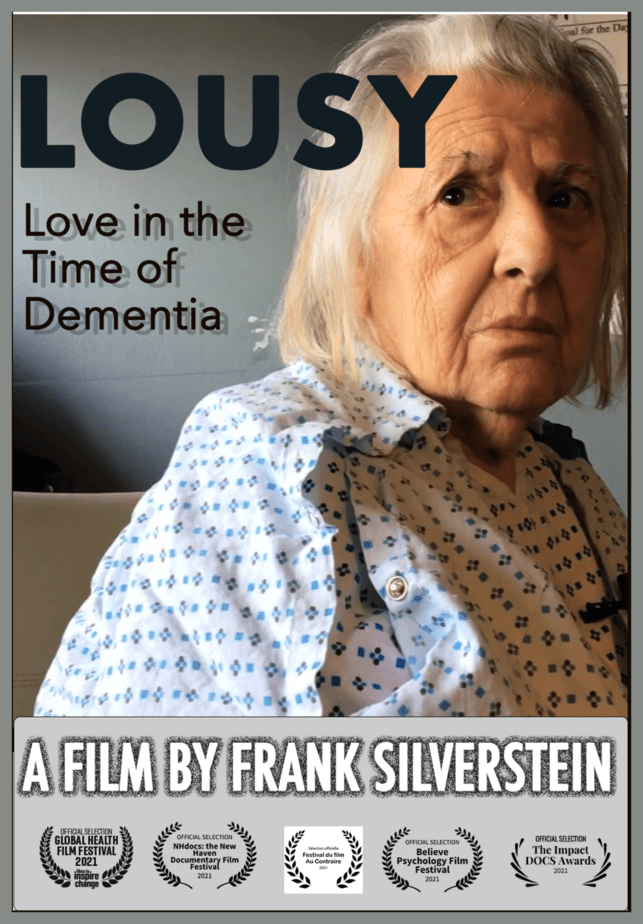By Frank Silverstein
“If I ever get like that, please just shoot me!”
Years ago, that’s what my parents said to me after visiting a neighbor who was living with advanced stage dementia. From that kind of distance it’s easy to understand their sentiment. After all, who can imagine a life lived without memories, without the ability to recognize your own spouse or make decisions about your daily life.
Up-close however, living with dementia is not as simple as it seems second hand. Those conditions aren’t predictable, they don’t all arrive at once, and when they do arrive they can be intermittent and punctuated by powerful moments of clarity. Unless you are regularly caring for someone with this condition you can’t see how complex it is, and that’s why I made this film.
Like most people, I was not familiar with how to assist a person with dementia. The early stages are easily overlooked, and the later stages are confusing, upsetting, and I had no idea of how to react. I often wondered if my parents’ anxious and hostile comments reflected their “true, unfiltered personality” or if it was just the rantings of someone whose mind has been distorted by a disease.
As my brother and I sought to take care of the two people who once took care of us, we felt helpless, angry, sad, and sometimes all of it at the same time. We were completely unprepared to take care of them because we were paralyzed by their unreasonable behavior, hammered by our own guilt, and isolated by embarrassment. And for these reasons, we were slow to seek help.
The day I first noticed something was wrong is also the day I first began making this film. My wife and I were visiting for lunch when my parents surprised us by demanding we leave their house immediately. We did. And when we returned an hour or so later, my mother was very upset because she didn’t know what happened to us. Why had we left the house? Where had we gone?
I had no idea what to say. But, as we all talked this through, it became clear that my parents, temporarily, had no idea who we were. As we continued talking, things got sorted out, and in the short term everything returned to normal. In the long term however, things were never going to be “normal” again.
I am a television journalist by profession. I am used to meeting people in times of crisis. I have been trained to observe and record the details of what’s happening in their lives with the goal of helping viewers understand and learn from those experiences. That’s why I took out my cell phone when we returned to the house, and I filmed our conversation. Over the course of the next several years, I continued filming many of the odd things that were said and done. I listened to and recorded my mother singing common songs with strange words added in here and there. I watched my father find joy in simple things he used to ignore, like a hot shave at the barber shop. I saw the power of music to calm my mother’s anxiety when all her prescription drugs failed.
As I collected these film clips of my parents’ disorientations I saw how they clung to each other— singing, shouting and dancing— defying a world that had overwhelmed them. The title: Lousy comes from one of my mother’s defiant reactions to her situation.
When it came time to edit the film into a narrative with a beginning middle and end, I noticed something that I hadn’t seen while actually filming them. I saw how their love for each other helped them cope with their own dementia and with each other’s dementia, hence the subtitle: “Love in the Time of Dementia.”
Underneath the daily chaos and confusion documented in the film, I also saw their core personalities— my father’s optimism and openness to new experiences and my mother’s need to organize and supervise her surroundings— remained intact right to the end. I saw that these emotional truths continued to guide them as they confronted a world they could barely understand. Their lives became so locked in the present that the past and the future had almost no meaning. All they had to guide themselves was their own emotions and instincts. The very things that made them who they were their whole lives. What persisted, and is visible here in this film, is an intense distillation of their personalities. The passions, fears, desires and grace that make my parents human, their core identities which steered our family through its colorful life, were still the key factors continuing to drive them forward. Once I discovered this in the film clips I was editing, finishing the film became a great joy.
I decided to make this film available so that it could be a window for others, who are going through a similar crisis, to see our family’s experience. I hope they can use the film as a measure to compare their particular circumstances, and to see that the changes that came to my parents are probably quite similar to the changes that have come to theirs. Furthermore, I hope viewers will see that they needn’t be ashamed or embarrassed by this condition. Rather, they should see what it’s like to cope with dementia, how our core personalities in fact prevail and continue to give meaning to our experiences even when so much of what we take for granted has been lost.
Watch the trailer for Lousy: Love in the Time of Dementia here
Watch the complete film on demand here
About the Author
 Frank Silverstein is an independent documentary filmmaker based in Hastings-on-Hudson, just north of New York City. Silverstein was born in Rangoon, Burma and spent much of his childhood growing up in Southeast Asia and in Princeton, NJ. For the past 15 years he was a newsmagazine producer at NBC where he helped launch and develop Your Business, a program devoted to small business entrepreneurship. During that time he produced many business profiles, reality-based makeovers, half-hour remote specials, podcasts, social media video, and print reports. He also co-authored the book It’s Your Business, published by Hachette, which was based on his own reporting along with the work of two other colleagues from NBC. Previous to that, much of his career was at ABC News, where he was on staff at 20/20, Primetime Live, and Day One. There, he developed and produced reports for Robert Krulwich, John Hockenberry, Bob Brown, John Stossel, Barbara Walters, Diane Sawyer, and others. Along the way he worked at CBS, CNN and CNBC and he began his career in television as an animator on Peewee’s Playhouse. Silverstein holds a master’s degree in American History from Columbia University and a bachelor of arts degree from Yale.
Frank Silverstein is an independent documentary filmmaker based in Hastings-on-Hudson, just north of New York City. Silverstein was born in Rangoon, Burma and spent much of his childhood growing up in Southeast Asia and in Princeton, NJ. For the past 15 years he was a newsmagazine producer at NBC where he helped launch and develop Your Business, a program devoted to small business entrepreneurship. During that time he produced many business profiles, reality-based makeovers, half-hour remote specials, podcasts, social media video, and print reports. He also co-authored the book It’s Your Business, published by Hachette, which was based on his own reporting along with the work of two other colleagues from NBC. Previous to that, much of his career was at ABC News, where he was on staff at 20/20, Primetime Live, and Day One. There, he developed and produced reports for Robert Krulwich, John Hockenberry, Bob Brown, John Stossel, Barbara Walters, Diane Sawyer, and others. Along the way he worked at CBS, CNN and CNBC and he began his career in television as an animator on Peewee’s Playhouse. Silverstein holds a master’s degree in American History from Columbia University and a bachelor of arts degree from Yale.
Silverstein’s parents, Josef and Marilyn Silverstein, began to show early symptoms of dementia around 2014, which he and his brother minimized as simple forgetfulness. By 2017, he and his brother, Gordon, realized their parents could no longer continue to live independently and made arrangements for them to move out of their home in New Jersey and into a house with Gordon in Connecticut. They lived in Gordon’s house where he cared for them with the help of several caregiving aides. Silverstein is now developing several independent productions focused on questions of aging.



